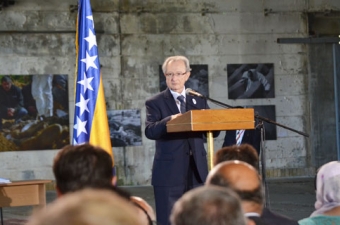President Carmel Agius is in Potočari, Bosnia and Herzegovina today to pay his respects to the victims of the Srebrenica genocide.
Speaking at a solemn event to commemorate the 21st anniversary of the genocide, President Agius began by saluting the survivors and families of the victims and stressing their key role in preserving a lasting memory of the horrific events of July 1995.
“A fundamental part of any reconciliation process is justice”, President Agius said, adding that “justice alone is not enough”. He pointed out that an open communication and exchange between ethnic groups are crucial for reconciliation. Members of different communities ought to jointly acknowledge the past, pay respect to victims and work together to ensure that such horrific crimes never happen again.
Turning to the role of the Tribunal, President Agius underlined its significance in uncovering the truth about what happened in Srebrenica 21 years ago. “I stand before you proud that the ICTY has incontrovertibly established that genocide did occur here, in Srebrenica, in July 1995, and that it has prosecuted and convicted a number of key figures responsible for it.” He added that the Tribunal’s contribution has enabled decisive rejection of the attempts to deny what happened, strengthened determination to preserve the memory and helped efforts to strive for peace and reconciliation.
“Only by fully acknowledging the past can we achieve a future of true and lasting reconciliation”, President Agius said. The victims of Srebrenica would only find peace “when they know they have not been forgotten; that their cruel and untimely death has somehow served to foster and secure a peaceful coexistence among all ethnic groups of this great country; that justice has been done; and that there is a commitment never to have another Srebrenica again”.
The ICTY is the first international criminal tribunal to enter convictions for genocide in Europe. In April 2004, the Appeals Chamber of the Tribunal determined for the first time, in the proceedings against Radislav Krstić, that genocide was committed in Srebrenica in 1995, with the execution of more than 7,000 Bosnian Muslim men and boys following the take-over of the town by Bosnian-Serb troops. In total, 20 individuals have been indicted by the Tribunal in relation to the events in Srebrenica and, to date, proceedings have been completed against 15 accused.


